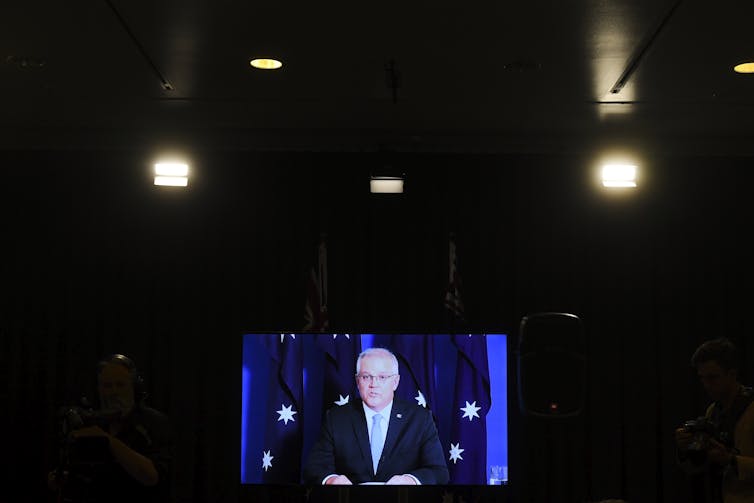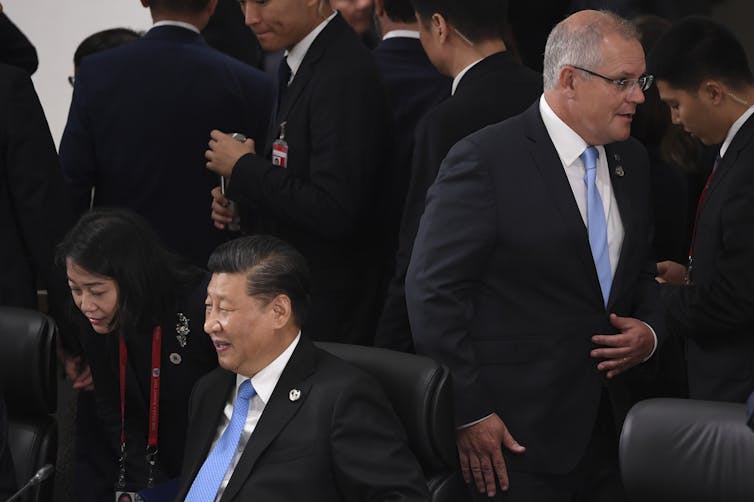Australia can repair its relationship with China, here are 3 ways to start
- Written by The Conversation
China has certainly got Australia’s attention with a highly inflammatory tweet[1] from a government spokesperson. It has provoked the desired reaction[2] — a storm of outrage.
Read more: Australia demands apology from China over 'repugnant' slur on Twitter[3]
This is the latest in an ever-growing list of problems between Australia and China. In recent days, China imposed new tariffs on wine[4], while Australia threatened legal action on barley[5].
None of this is inevitable. Australia and China may not be best friends anytime soon, but they can reset the relationship.
Australia could make one big gesture and two small to improve its relationship with China. As federal parliament meets in Canberra, there is even an opportunity to start this week.
What’s wrong?
It’s the multi-billion dollar question: what could the Australian government do if it wanted to reset the relationship with China?
Sometimes when China has dealt out economic punishment, the desired result has been clear — such as pressuring South Korea to cancel a missile defence system[6]. But in Australia’s case, China’s displeasure is not directed towards one policy. It’s more a sense Australia has been acting in an unfriendly, hostile[7] manner and this has consequences[8].
We know this because China recently leaked a 14-point list of grievances[9] via the Australian media. It contained no surprises[10], but is useful to show where there may be room to manoeuvre.
Beijing’s 14 points
Out of the 14, there were only a few relating to what I see as non-negotiable interests. These relate to Australia’s criticism of human rights abuses[11] in China, cyber-attacks[12] and the South China Sea[13] dispute.
Quite a few should also be interpreted as venting — such as China’s criticism of Australia’s foreign interference powers[14] and Australia’s decision to exclude Huawei[15] and ZTE[16] from the 5G network over national security concerns. Realistically, Australia is not going to reverse these decisions.
Read more: Chinese reveal their journalists in Australia were questioned in foreign interference investigation[17]
Similarly, Australia’s call for an inquiry into COVID-19[18], questions over the origins of the virus[19], alleged raids[20] on Chinese journalists and revoking visas[21] for Chinese scholars are now in the past.
Others on the list are gripes China knows the Australian government can’t do much about, such as “antagonistic” media reports or members of parliament making “outrageous” comments[22].
But the language used in the 14-points suggests many of the problems are less about the policy and more about how it’s been communicated, such as former Prime Minister Malcolm Turnbull announcing foreign interference legislation as “standing up to China[23]”.
Read more: An all-out trade war with China would cost Australia 6% of GDP[24]
Australia may come to regret being stridently[25] tough on China without thinking through the real-world[26] consequences. It costs China very little to punish Australia economically in sectors[27] where it has other suppliers or wants to encourage domestic production.
If the core problem is a perception that Australia is unfriendly, this suggests the best way to show a desire for better relations is through a big gesture — ideally one that is showy but low cost. China has said it wants actions, not words, so a speech[28] alone won’t cut it[29].
The grand gesture
If Australia did want to signal a desire to be more friendly without changing any of its policies, what might it do?
 Prime Minister Scott Morrison has demanded China apologise for an offensive tweet about Australian soldiers.
Lukas Coch/ AAP
Prime Minister Scott Morrison has demanded China apologise for an offensive tweet about Australian soldiers.
Lukas Coch/ AAP
The best candidate would be to sign up for the Belt and Road Initiative[30]. There is zero chance this will happen — despite earlier neutral comments[31], the federal government has made this clear[32]. But it meets all the criteria for a gesture to reset the relationship.
First, it’s entirely symbolic and doesn’t bind Australia to do anything. Australia can participate in individual projects or not as it chooses. Second, there’s no material cost to Australia, or any need to alter substantive policies. Yet it would be read as a significant gesture by China.
Read more: Why is there so much furore over China's Belt and Road Initiative?[33]
The fact that it’s not on the table shows how the range of options to pursue the national interest has been narrowed by priming the public[34] to see China as an enemy, rather than as a challenge to be managed.
Two other options
There are two smaller options that are achievable and in Australia’s interests. And they are both before parliament.
First, the Senate is currently debating a bill[35] to give the Foreign Affairs Minister the power to cancel international agreements entered into by state governments, local councils and universities. China has specifically named this in its grievances as “targeting” China.
Read more: Morrison's foreign relations bill should not pass parliament. Here's why[36]
I’ve argued in detail[37] why it’s a terrible piece of legislation that would impose a large compliance burden and negatively affect[38] Australia’s international engagement. It would be in Australia’s own interests to drop it and come up with a better, more targeted response.
Second, parliament is also looking at amendments to foreign investment[39] rules, which China singled out at the top of its list as “opaque”. Foreign investment puts money into the Australian economy so this is an area of potential mutual interest.
China’s complaint is the lack of transparency[40] about which investments get approved — it sees the process as ideological[41]. The Australian government could, for example, postpone proposed amendments and consult with investor countries about how the process could be improved in Australia’s self-interest.
A diplomatic mindset
Some will say Australia shouldn’t do any of these things precisely because China might want them. And China is hardly helping its case[42] by exercising subtle or effective diplomacy.
But deciding to always oppose lets China control your behaviour. We need a negotiation mentality. We need to find things we don’t mind giving that China values in order to get what we want. That’s not “capitulation[43]” or “obeisance[44]” — it’s acting in our own self-interest.
 Australia cannot change China, but it can change how it responds.
Lukas Coch/AAP
Australia cannot change China, but it can change how it responds.
Lukas Coch/AAP
Australia has no ability to remake China into a completely different country. We need to live with it[45]. This means both [46] standing up to China and getting along — hardening our defences[47], while ensuring our economic prosperity. Without an economy, a country can’t pay to keep itself safe.
Australia is not under military attack, offensive as China’s “wolf warrior diplomats[48]” can be.
Australia and China have disputes that can and should be managed diplomatically. It is not inevitable we must have a bad relationship – and it’s certainly not a sign of success[49] if we do.
References
- ^ tweet (thenewdaily.com.au)
- ^ reaction (www.theguardian.com)
- ^ Australia demands apology from China over 'repugnant' slur on Twitter (theconversation.com)
- ^ tariffs on wine (www.scmp.com)
- ^ barley (www.abc.net.au)
- ^ cancel a missile defence system (www.theasanforum.org)
- ^ unfriendly, hostile (au.china-embassy.org)
- ^ consequences (www.globaltimes.cn)
- ^ 14-point list of grievances (www.9news.com.au)
- ^ no surprises (www.ft.com)
- ^ human rights abuses (www.theguardian.com)
- ^ cyber-attacks (7news.com.au)
- ^ South China Sea (www.lowyinstitute.org)
- ^ foreign interference powers (www.aph.gov.au)
- ^ exclude Huawei (www.news.com.au)
- ^ ZTE (www.bbc.com)
- ^ Chinese reveal their journalists in Australia were questioned in foreign interference investigation (theconversation.com)
- ^ inquiry into COVID-19 (www.abc.net.au)
- ^ origins of the virus (www.news.com.au)
- ^ alleged raids (www.theguardian.com)
- ^ revoking visas (theconversation.com)
- ^ comments (www.abc.net.au)
- ^ standing up to China (www.abc.net.au)
- ^ An all-out trade war with China would cost Australia 6% of GDP (theconversation.com)
- ^ stridently (johnmenadue.com)
- ^ real-world (www.internationalaffairs.org.au)
- ^ sectors (www.economist.com)
- ^ speech (www.pm.gov.au)
- ^ won’t cut it (www.smh.com.au)
- ^ Belt and Road Initiative (www.lowyinstitute.org)
- ^ earlier neutral comments (www.australiachinarelations.org)
- ^ made this clear (theconversation.com)
- ^ Why is there so much furore over China's Belt and Road Initiative? (theconversation.com)
- ^ narrowed by priming the public (www.lowyinstitute.org)
- ^ bill (www.aph.gov.au)
- ^ Morrison's foreign relations bill should not pass parliament. Here's why (theconversation.com)
- ^ argued in detail (theconversation.com)
- ^ negatively affect (pursuit.unimelb.edu.au)
- ^ foreign investment (www.aph.gov.au)
- ^ lack of transparency (thenewdaily.com.au)
- ^ ideological (www.globaltimes.cn)
- ^ hardly helping its case (www.theaustralian.com.au)
- ^ capitulation (www.smh.com.au)
- ^ obeisance (www.smh.com.au)
- ^ live with it (www.theaustralian.com.au)
- ^ both (www.themandarin.com.au)
- ^ defences (www.afr.com)
- ^ wolf warrior diplomats (www.brookings.edu)
- ^ sign of success (www.aspistrategist.org.au)

















